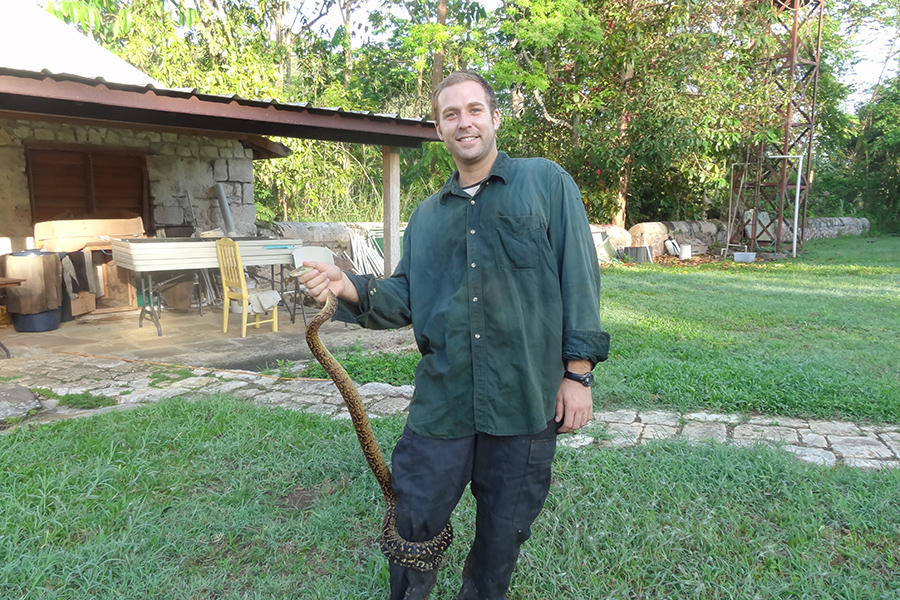

Venture Boldly

Office of Communications
2 East South Street
Galesburg, IL 61401


When Brent Newman started researching the Jamaican yellow boa for his Fulbright Fellowship last year, he was warned that he might manage to capture only one or two of the elusive snakes.
But as things turned out, the 2010 Knox College graduate caught more than two dozen yellow boas during his 10-month stay in Cockpit Country, Jamaica. Microchips were surgically implanted in several snakes, and Newman used radio-tracking technology to monitor their movements -- learning more about their habitats, diets, and breeding seasons in the process.
The Jamaican yellow boa is a vulnerable species, according to the International Union for Conservation of Nature. It is threatened by loss of habitat, the invasive Indian Mongoose, and people who kill it because they mistakenly regard it as poisonous. Part of Newman's goal for his Fulbright project was to help with efforts to protect the snake.
While pursuing his snake studies, Newman -- who majored in environmental studies, minored in Spanish and biology, and conducted research at Knox's Green Oaks Biological Field Station -- was based at the Windsor Research Centre. In an unexpected twist, he also wound up teaching Spanish twice a week to first- through sixth-graders at a nearby primary school.
"The school principal asked me, ‘What do you know about Spanish?'" recalled Newman, a native of Dallas, Texas. "I said, ‘Well, I minored in it at my college, and I studied for eight months in Barcelona, (Spain,) so I really feel I could contribute by being a Spanish teacher here.'"
Studying in Barcelona "completely changed my life," he said. "I realized how much you can learn from other cultures.
"The whole Knox experience was great because I had the in-class information, what I learned from taking basic courses and upper-level courses, but then I could also throw in my knowledge of Spanish culture," he added.
Though the school didn't have much money, the young students repeatedly demonstrated their resourcefulness, Newman said. For example, some first-graders retrieved empty cardboard boxes from trash bins, brought them to school, and fashioned flash cards for Spanish.
"That's how we practiced words like ‘mother,' ‘father,' ‘bread,' 'chicken,'" he said. "It was humbling."
A former running back with the Prairie Fire football team, Newman also helped coach the school's fifth- and sixth-grade boys soccer squad.
During recesses and lunch periods, he and the children would swap stories -- often talking about animals, including the snakes he was studying.
"I didn't mean to get as involved with the school as I did, but looking back, I would not change it at all," he said. "It only helped my research."
Newman lived in Sherwood Content -- hometown of "fastest man in the world" Usain Bolt, who won a combined six gold medals in the 2012 and 2008 Summer Olympics -- and became friends with several of Bolt's relatives, including his parents.
Longtime residents of Sherwood Content have grown wary of outsiders, Newman said, because the visitors often dart in and out of town to conduct their business, not taking time to interact with the community.
"As someone who wants to be a scientist and work in the field, I had never seen it from that perspective," he said. "Before you even step foot in an area, you need to meet the people first who have been there since Day One. The relationships you have with the community before you start doing your work will determine how your work goes."
"As I formed better relationships, people would come up to me saying, ‘Hey, I have a snake here,' or ‘I can show you a spot where I've seen snakes for the past 30 years.'"
Newman hopes to continue with his boa research after he begins graduate studies this fall at Texas A&M University-Kingsville, where he will pursue a master's degree in range and wildlife management.
He credits his Knox liberal arts education with expanding his view of the world.
"I see things, I hear things, and I feel things, and I process them through a mind that's been shown a whole variety of perspectives from all over -- from the classes I've taken, from the study-abroad experience, from living at Green Oaks," he said. "You can't just get that anywhere. The liberal arts are vital to furthering yourself in society today, in work, and in connecting with your community."
(Photos at top of page: Brent Newman with a Jamaican yellow boas he caught.)
Published on August 13, 2012